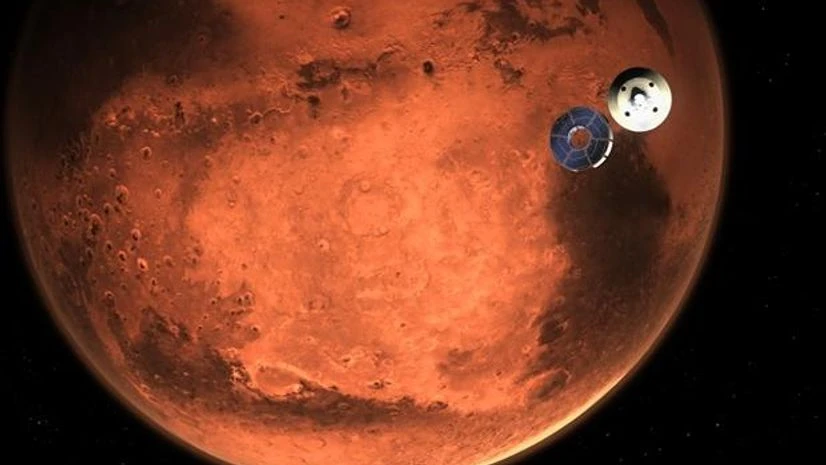From flybys to orbiters and landers, more than 40 missions have been launched to Mars to explore different aspects of the red planet which has long tickled the imagination of astronomers and space explorers.
The recent detection of plumes of methane in the northern hemisphere of Mars is of great interest because of its potential biological origin, though other explanations may also be possible. This is what generates a lot of interest in the planet.
Methane (CH4) is an organic molecule present in gaseous form in the Earth's atmosphere. More than 90 per cent of methane on the Earth is produced by living organisms.
February has been an important month with regard to Mars as missions to the planet from the US, China and UAE this month are at different stages.
As NASA gears up for the landing of its rover -- the 'Perseverance' -- to Jezero Crater, a place that planetary scientists think could be ideal to find preserved signs of life from several billion years ago, if life ever did arise on Mars, eight countries have undertaken missions to explore the planet.
Chinese mission Tianwen 1 was launched on July 23, 2020. After making a trip of seven months, it arrived in the Martian orbit on February 10. The lander is expected to land somewhere in the Utopia Planitia region, currently scheduled for May 2021.
The UAE's 'Hope' mission also entered the Mars orbit earlier this month. It's also the UAE's first interplanetary mission.
More From This Section
Just like exploration of the Moon, the then USSR was the first to send a mission to Mars. According to the European Space Agency (ESA) database, Marsnik 1 was launched on October 10 1960. A flyby mission, it did not reach the Earth's Orbit.
From 1960 - 62, the USSR launched five missions to Mars --- Marsnik 1, Marsnik 2, Sputnik 22, Mars 1 and Sputnik 24.
It was on November 5, 1964 that the US launched 'Mariner 3'. A flyby mission, the launcher shroud failed to jettison.
During the peak of the Cold War in the 1960s, the two superpowers fiercely competed with each other in this area. From 1960-69, the two countries launched 12 missions to Mars four by the US and eight by the USSR.
The two countries launched nearly 25 missions from 1960-1989.
It was only on July 3, 1998 that a new entrant launched any mission to explore Mars, when Japan launched the 'Nozomi' mission. It failed to enter orbit and flew by Mars on December 14, 2003 at a distance of 1,000 km. No data was returned.
In 2003, the European Space Agency and the UK Space Agency embarked on a mission to Mars. Launched in June 2003, a 'Beagle 2' lander was carried to Mars by 'Mars Express orbiter'.
The orbiter and lander arrived on December 25, 2003. Beagle 2 was successfully released but no further contact was made and the lander was declared lost.
In January 2015, the UK Space Agency announced that the lander had been identified in images from NASA's Mars Reconnaissance Orbiter. The images appeared to show the lander partially deployed on the surface.
The last decade saw China making rapid strides in the area of space exploration. Joint launch of Russian Phobos lander and sample return mission and Yinghuo-1, a Chinese Mars orbiter took place on November 8, 2011.
The Phobos-Grunt/Yinghuo-1 spacecraft did not perform its scheduled burn to begin its trajectory to Mars and could not leave Earth's orbit. It re-entered Earth's atmosphere on January 15, 2012, said the NASA database on Mars missions.
India is one of the few nations to carry out a successful Mars mission in its first attempt.
The Mars Orbiter Mission (MOM) was launched on November 23, 2013. Pegged to be one of the cheapest missions to Mars -- at around USD 74 million --, Prime Minister Narendra Modi had said the journey to Mars was cheaper than an auto ride.
(Only the headline and picture of this report may have been reworked by the Business Standard staff; the rest of the content is auto-generated from a syndicated feed.)

)
